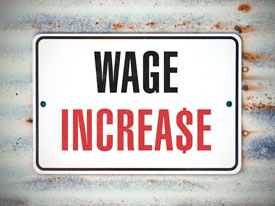 NEW YORK—A new forecast predicts that salary increase budgets for U.S. employers will grow 3 percent on average in 2018 across most employee categories, essentially unchanged from 2017.
NEW YORK—A new forecast predicts that salary increase budgets for U.S. employers will grow 3 percent on average in 2018 across most employee categories, essentially unchanged from 2017.
WorldatWork, an association of total rewards professionals, released Top-Level Results: WorldatWork Salary Budget Survey, with actual 2017 and projected 2018 salary budget increases that account for planned cost-of-living adjustments and merit increases.
Keep in mind that salary budget increases represent additional funds that employers plan to spend on employee compensation, and do not represent the average salary or wage increase that employees will receive
In the table below, the "mean" is the mathematical average while the "median" is the middle value after listing reported budget increase expectations in successive order. Outliers, or extreme values on either the high or low end, have the biggest effect on the mean and less effect on the median.

Source: WorldatWork 2017-2018 Salary Budget Survey, top-level results. Survey data collected through May 2017.
WorldatWork this year received 4,942 survey responses from 11 countries in addition to the U.S. and Canada.
In Canada, the average 2017 salary budget increase (both mean and median) was 3.0 percent, WorldatWork reported. For 2018, Canadian employers project a salary budget increase of 3.1 percent (mean) and 3.0 percent (median).
WorldatWork's findings mirror other 2018 salary projections. For example, 2018 pay projections were reported last May in Planning Global Compensation Budgets for 2018 by ERI Economic Research Institute, a compensation analytics firm.
The firm's forecast, based on data from over 20,000 companies in its research database and analysis of government statistics, projected that U.S. salary increase budgets will grow by 3.2 percent in 2018, up from a 3.1 percent increase in 2017 and 3.0 percent in 2016.
With this being said, you need to keep in mind that wages have not kept up with rising productivity in the U.S. and elsewhere. Technology in numerous forms continues to replace people in many areas, and competition from lower-cost global labor markets, are among the reasons why.
For employers, the economic recovery provides "an opportunity to look at their total rewards strategies and practices" to ensure fair distribution of rewards based on performance for all employee groups, Cox said.
Employers who are reading this article, should ask whether or how your company is preparing their work force for technological advances, such as artificial intelligence, that will create new opportunities for skilled employees while continuing to displace other jobs.
Hedley Lawson, Contributing Editor
Managing Partner
Aligned Growth Partners, LLC
(707) 217-0979
hlawson@alignedgrowth.com
www.alignedgrowth.com